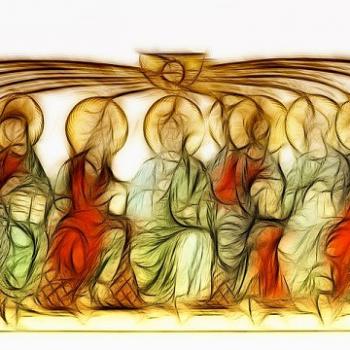My relationship with adult beverages began when I was in high school. Of course, 95% of the adults in this country would probably say the same thing, but my story is a bit different. Alcoholic beverages were among the dozens of things that good Baptists did not indulge in (along with dancing, movies, colorful language, . . .). My father was a conservative Protestant minister, a national vice president of the IFCA, for God’s sake. That’s the Independent Fundamental Churches of America, in case you are interested.
But my father was evolving as I grew from childhood into adolescence. Imagine my shock when I returned from school one day and discovered my father sitting in our living room, reading the Bible, listening to classical music on the stereo, and drinking a glass of . . . wine. Actually, it was a very small glass of cheap sherry. But it was an alcoholic beverage. I was almost as shocked as I had been the previous summer when he took my brother and me to see our first movie in a theater–“The Sound of Music”–forty miles away from my grandparents’ house where we were visiting so that no one would know what forbidden activities he was introducing us to.
Even in his most buttoned-down Baptist days, my father was an iconoclast. He delighted in saying things from the pulpit intended to disturb and even shock those who were comfortable in their dogmatic certainty about all things God-related. He would ask things like “What are we supposed to make of a guy who made vats of the best wine anyone had ever tasted for his first miracle?” Which brings us to today’s gospel reading from John.
Two of Jesus’ most famous reported miracles, turning water into wine at the wedding at Cana, and the raising of Lazarus from the dead, are bookend miraculous extravaganzas at the beginning and close of Jesus’ public ministry in John’s gospel. Neither of these miracles are recorded in any of the three synoptic gospels; sometimes I wonder if John made them up. But I’ll leave it to the theologians and the religious studies scholars to figure out those sorts of issues. I prefer to reimagine the stories, including the miracles, as just another day in the lives of people 2000 years ago who were, undoubtedly, as clueless about the big picture as we tend to be in our own contemporary lives.
That’s why I love “The Chosen,” a multi-year cinematic treatment of the life of Jesus that is currently two seasons into a projected run of seven seasons. All of the characters in “The Chosen,” Jesus included, are treated as real persons with recognizable human strengths, weaknesses, and peccadilloes. Jesus, for instance, is charismatic and is frequently an agent of change and healing simply by showing up, but is also introverted, occasionally unsure of himself, and very bad with directions.
The centerpiece of the fifth episode in season one is the wedding at Cana. Jesus’s mother Mary is best friends with the mother of the groom, Dinah, and arrives early to help with preparations for the wedding ceremony and celebration that evening. As they converse, we learn that although Dinah and her husband love their daughter-in-law to be, they aren’t as crazy about her parents, who are wealthy and think that their daughter is marrying down from her and their social status. Dinah is concerned that everything be perfect, even though the budget is limited. Sound like any other weddings you’ve ever been involved with? Just about all of them, probably.
As the day progresses, Mary keeps her eye out for her son Jesus, who is on the invite list and is expected to attend the wedding. As they discuss her son, whom she clearly loves but does not fully understand, Mary mentions to Dinah that “a few” extra people may be coming with Jesus, a motley and ever-growing group of people attracted to the charismatic young teacher. Dinah generously says that everyone is welcome but adding in even a few extra people will undoubtedly put a strain on the food and drink budget and supply already stretched to the limit.
As it turns out, Jesus arrives with Simon, Andrew, James, John, Nathaniel, Thaddeus, another James (“little James” in contrast to “big James” who is a head taller), and Mary Magdalene, all people whose back stories have been developing over the past episodes. Other unexpected and uninvited folks also show up, perhaps as interested in Jesus as in the wedding festivities, making the actual number of attendees twice as large than had been planned for. When this is announced to Thomas and Ramah, the caterers in charge of food and drink, it soon becomes clear what a huge problem this is. The party is expected to go on for days, everyone expects to be drinking a great deal of wine, and the wine purchased for the event is already gone.
You know what happens next. Mary pulls Jesus, who is having a great time with his friends dancing and telling stories, aside and asks him to do something about the problem which, if unaddressed, will be devastatingly embarrassing for her friend Dinah and her husband. In the gospel account, Jesus is rude to his mother, saying “Woman, what does your concern have to do with me? My hour has not yet come.”
In “The Chosen,” Jesus is, fortunately, less of a jerk and, upon hearing about the wine shortage, asks “Why are you telling me this?” When Mary explains how humiliating the situation will be for her friends, Jesus says “my time has not yet come,” perhaps unsure even himself about his own capacities and abilities. In an inspired (if I may say so) response that is not in the gospel, Mary replies “if not now, when?” Jesus nods and proceeds over the next few minutes to turn water in large stone containers into the best wine anyone has ever tasted.
The only people in “The Chosen” rendition of the story who know that a miracle has occurred are Jesus, his mother, Thomas, and Ramah. Thomas, who has showed himself throughout the episode to be a no-nonsense, logical numbers guy, tells Ramah at the end of the episode that Jesus has invited him to join his growing entourage in Samaria twelve days later. When Ramah asks whether he is going to do it, Thomas says “I don’t know what to think.” Ramah, who knows Thomas well (and suspects that he has a thing for her), replies “So don’t. Maybe for once in your life, don’t think.”
When it comes to the reported miracles of Jesus, this is excellent advice. Earlier in the episode, when it becomes clear what has happened, Ramah asks “Who is he? I can’t pretend I didn’t see a miracle.” For me, and I suspect for many of us who call ourselves Christian, this line captures why I am a person of faith. Miracles come in all shapes and sizes, both unmistakable and inexplicable. Anne Lamott writes that “Grace means you’re in a different universe from where you had been stuck, when you had absolutely no way to get there on your own.” That’s a miracle. Faith is committing yourself to seeing how that miracle plays out.












